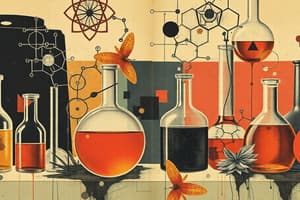Podcast
Questions and Answers
What is the primary focus of a Bachelor of Science in Chemistry degree?
What is the primary focus of a Bachelor of Science in Chemistry degree?
- Study of environmental impacts of chemicals
- Study of matter and its changes (correct)
- Study of historical chemistry practices
- Study of engineering principles
Which of the following subjects is NOT a core subject in BSc Chemistry?
Which of the following subjects is NOT a core subject in BSc Chemistry?
- Organic Chemistry
- Analytical Chemistry
- Physical Chemistry
- Environmental Chemistry (correct)
During a BSc Chemistry program, which skill is emphasized for laboratory work?
During a BSc Chemistry program, which skill is emphasized for laboratory work?
- Creative writing skills
- Installation and use of lab equipment (correct)
- Artistic skills for chemical visualization
- Foreign language proficiency
Which career opportunity is related to BSc Chemistry graduates?
Which career opportunity is related to BSc Chemistry graduates?
What type of analytical methods are used in Analytical Chemistry?
What type of analytical methods are used in Analytical Chemistry?
What is a potential further education path after obtaining a BSc in Chemistry?
What is a potential further education path after obtaining a BSc in Chemistry?
Which of the following is a laboratory safety practice emphasized during BSc Chemistry studies?
Which of the following is a laboratory safety practice emphasized during BSc Chemistry studies?
What analytical skill is developed through a BSc in Chemistry?
What analytical skill is developed through a BSc in Chemistry?
Which organization is NOT considered a professional organization for chemists?
Which organization is NOT considered a professional organization for chemists?
What is typically required for admission to a BSc Chemistry program?
What is typically required for admission to a BSc Chemistry program?
Flashcards are hidden until you start studying
Study Notes
Overview of BSc Chemistry
- Definition: Bachelor of Science in Chemistry (BSc Chemistry) is an undergraduate degree focusing on the study of matter, its properties, reactions, and the changes it undergoes.
- Duration: Typically a 3 to 4-year program, depending on the country and institution.
Core Subjects
- Inorganic Chemistry: Study of inorganic compounds, metals, minerals, and organometallic chemistry.
- Organic Chemistry: Focuses on the structure, properties, reactions, and synthesis of organic compounds and materials.
- Physical Chemistry: Combines principles of physics and chemistry; involves thermodynamics, kinetics, and quantum chemistry.
- Analytical Chemistry: Techniques and methods for analyzing substances to determine their composition and structure.
- Biochemistry: Study of chemical processes within and related to living organisms; explores biomolecules like proteins and nucleic acids.
Laboratory Skills
- Techniques: Installation and use of laboratory equipment (e.g., centrifuges, chromatographs).
- Safety Protocols: Importance of adhering to safety rules and regulations in the lab environment.
- Data Analysis: Use of statistical methods for interpreting experimental data.
Electives and Specializations
- Environmental Chemistry
- Medicinal Chemistry
- Polymer Chemistry
- Supramolecular Chemistry
Career Opportunities
- Industry: Pharmaceuticals, petrochemicals, food and beverage, cosmetics.
- Research: Academic institutions, government labs, R&D departments.
- Education: Teaching roles at high schools or community colleges.
- Regulatory Affairs: Compliance and safety evaluation in chemical production.
Skills Developed
- Analytical thinking and problem-solving.
- Laboratory skills and safety practices.
- Familiarity with scientific software and data analysis tools.
- Communication skills for presenting findings.
Further Education
- Possible pathways include pursuing a Master's degree (MSc) or PhD in Chemistry or related fields.
- Opportunity to specialize in niche areas of chemistry through advanced study.
Professional Organizations
- American Chemical Society (ACS)
- Royal Society of Chemistry (RSC)
- Various national and international chemistry societies
Admission Requirements
- Completion of secondary education with a focus on science subjects (typically Chemistry, Physics, and Mathematics).
- Some institutions may require entrance exams or interviews.
Importance of BSc Chemistry
- Foundation for understanding the natural world and various scientific principles.
- Essential for addressing challenges in health, industry, and environmental sustainability.
BSc Chemistry Overview
- A 3-4 year undergraduate degree focused on the study of matter, its properties, and reactions.
- Focuses on understanding the chemical world and its applications in various industries.
Core Subjects
- Inorganic Chemistry: Studying inorganic compounds, metals, minerals, and their properties and reactions.
- Organic Chemistry: Exploring the structure, properties, and reactions of organic compounds, including carbon-based molecules.
- Physical Chemistry: Combining physics and chemistry principles, covering thermodynamics, kinetics, and quantum chemistry.
- Analytical Chemistry: Developing and using techniques to analyze substances, determining their composition and structure.
- Biochemistry: Studying chemical processes within living organisms, focusing on biomolecules like proteins and nucleic acids.
Laboratory Skills
- Emphasizes hands-on experience with chemical experiments.
- Includes practical training in techniques like using centrifuges, chromatographs, and other lab equipment.
- Stresses the importance of safety protocols for working in a laboratory environment.
- Develops data analysis skills using statistical methods to interpret experimental results.
Electives and Specializations
- Allows students to explore specific areas of chemistry based on their interests.
- Common elective options include Environmental Chemistry, Medicinal Chemistry, Polymer Chemistry, and Supramolecular Chemistry.
Career Opportunities
- Provides a foundation for various careers in industry, research, education, and regulatory affairs.
- Industry roles: Pharmaceuticals, petrochemicals, food and beverage, cosmetics.
- Research positions: Academic institutions, government labs, R&D departments.
- Education: Teaching positions in high schools or community colleges.
- Regulatory affairs: Ensuring compliance and safety in chemical production.
Skills Developed
- Analytical thinking and problem-solving: Essential for scientific inquiries and research.
- Laboratory skills and safety practices: Hands-on experience and knowledge of safe lab procedures.
- Familiarity with scientific software and data analysis tools: Utilizing software to analyze experimental data.
- Communication skills: Effectively communicating research findings and scientific concepts.
Further Education
- Many graduates pursue advanced degrees like a Master's (MSc) or PhD in Chemistry or related fields.
- Allows for specialization in niche areas of chemistry through advanced research and study.
Professional Organizations
- Networking opportunities and support for chemists through professional organizations like the American Chemical Society (ACS) and the Royal Society of Chemistry (RSC).
- Various national and international chemistry societies also provide professional development and networking opportunities.
Admission Requirements
- Typically requires completion of secondary education with a strong foundation in science subjects, including Chemistry, Physics, and Mathematics.
- Some institutions may have additional requirements like entrance exams or interviews.
Importance of BSc Chemistry
- Provides a fundamental understanding of the natural world and various scientific principles.
- Essential for addressing challenges in fields like health, industry, and environmental sustainability.
- A key degree for contributing to scientific advancements and breakthroughs.
Studying That Suits You
Use AI to generate personalized quizzes and flashcards to suit your learning preferences.




